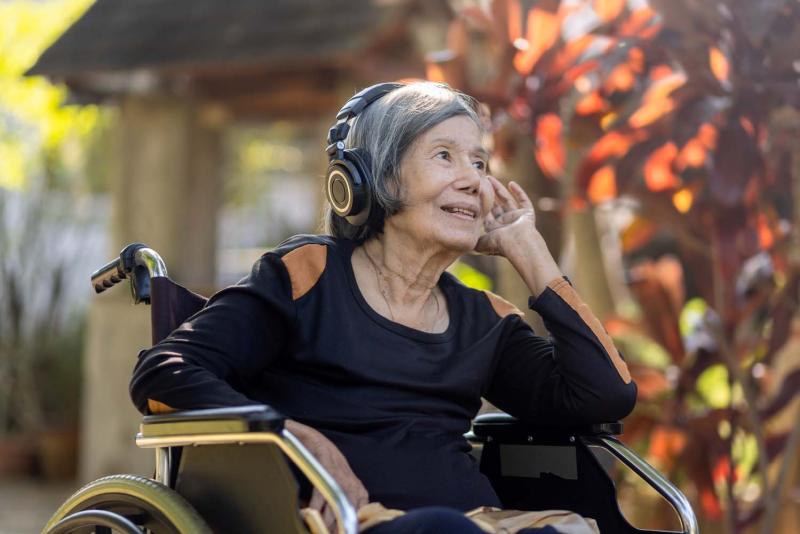Key points
- Music-based interventions may require people to play an instrument or sing or simply listen to live or recorded music.
- Music-based interventions appear to benefit people living with dementia in residential aged care. Researchers have noted significant improvement in responsive behaviours, including care refusals, and mealtime eating.
- Music may also influence anxiety, depression, and agitation in people with dementia.
Music-based interventions, including music therapy, are often used to reduce responsive behaviours of dementia such as agitation and aggression. [1] Music sessions are usually delivered to individuals or groups by a qualified music therapist, mostly in a residential aged care setting. [2] These sessions might require people to actively participate by playing an instrument, singing, [3] or moving to the music. [4] They might also be passive, with individuals listening to recorded or live music. [5] The therapist may choose music for passive listening sessions, or it might be chosen based on personal preferences. [4]
This evidence theme on music-based interventions is a summary of one of the key topics identified by a scoping review of dementia research. If you need more information on this topic, try using the PubMed search below.
There is strong evidence that music-based interventions provide positive benefits for people living with dementia in residential aged care. Several reviews note relatively large improvements in:
- Responsive behaviours, [3, 5-11] including care refusals [12, 13] and mealtime eating behaviours. [14]
There were also moderate improvements in:
- Anxiety [3, 6, 9, 11, 15]
- Agitation [4, 6, 8, 11, 16] (although not observed in one review [9])
- Apathy [11, 17]
- Depression and mood [2, 3, 7, 9]
- Quality of life [9]
- Cognitive function (general cognitive function, executive function, episodic memory) [18]
- Social interactions. [19]
Smaller effects were observed for improved social behaviour. [9, 15] There may also be important differences in effectiveness depending on what the music sessions include. For example, better results were seen with:
- Singing activities (large reduction in pain and depression and improved mood, possibly due to the social nature of this activity) [15]
- Sessions led by a music therapist [2]
- Sessions following a set protocol [16]
- Passive group listening rather than active participation [8]
- Listening to recorded music rather than live [7, 20]
- Using music chosen by the therapist rather than personalised choices [7]
- Music in a classical/relaxation style. [7]
One review [21] examined the benefits of music therapy for people with dementia living in the community. It found music-based interventions had positive effects on some cognitive functions such as autobiographical memory, language abilities, short-term memory and working memory, as well as quality of life, wellbeing, pain and anxiety. They did not determine that singing (active therapy) was any better than listening (passive therapy) or vice versa. However, the quality of studies overall was low to moderate. Another review found that any type of music intervention has beneficial effects on general cognitive function. [18]
Across all types of sessions and stages of dementia, there were no reported safety issues. However, trained music therapists will take care to consider the potential for music to trigger unpleasant or sad memories. They also warn about relying on the same piece of music for cuing activities such as mealtimes. Used in this repetitive way, music might lead to over-stimulation.
Despite the strength of evidence provided, reviewers raised questions over some of the study methods. These included concerns that:
- Studies did not compare the effectiveness of music-based interventions across different stages of dementia
- Studies differed in the type, frequency, and duration of the music activity
- It is unclear how long benefits last
- The professional background of the facilitator was not always reported.
- If a professional music therapist is not available, care workers and family carers might use music to bring enjoyment to people living with dementia. Read the e-book Living well with dementia through music from Dementia Australia (free registration) to know more.
- Family carers and care workers might try providing suitably calming background music at certain times of the day such as bath and mealtimes. [15]
- Not everyone will want to be involved in a musical activity. It is important to be aware of the individual’s willingness to join in and respect their wishes.
- Consider introducing group music therapy sessions to a residential care facility. Conduct sessions several times a week for the most benefit. [3, 9]
- Employ a music therapist who is trained to observe and respond to adverse responses such as overstimulation or distressing memories. [22]
- Consider investing in resources to enable access to music for staff, volunteers, residents, and their families. This could include instruments such as a piano or ukuleles available onsite, building a music CD library, or subscription to a music streaming service, along with equipment to listen to music.
- Encouraging visiting families and friends to listen to music or engage in music-making with their family members can give them a useful role during visits and support their ongoing relationship with the resident.
- Consider upskilling volunteers to use music proactively to support their work with people living with dementia.
There are good justifications for doing this:
- The intervention is supported by evidence.
- It is cost-effective and has been shown to reduce the use of antipsychotic drugs for managing responsive behaviours.
- Music is enjoyable and creates a happy environment for staff and residents. Music might also be considered a human right. [1]
- Amano T, Hooley C, Strong J, Inoue M. Strategies for implementing music-based interventions for people with dementia in long-term care facilities: A systematic review. Int J Geriatr Psychiatry. 2021;14:14.
- Li HC, Wang HH, Lu CY, Chen TB, Lin YH, Lee I. The effect of music therapy on reducing depression in people with dementia: A systematic review and meta-analysis. Geriatr Nurs. 2019;40(5):510-6.
- Chang YS, Chu H, Yang CY, Tsai JC, Chung MH, Liao YM, et al. The efficacy of music therapy for people with dementia: A meta-analysis of randomised controlled trials. J Clin Nurs. 2015;24(23-24):3425-40.
- Pedersen SKA, Andersen PN, Lugo RG, Andreassen M, Sütterlin S. Effects of music on agitation in dementia: A meta-analysis. Front Psychol. 2017;8:742.
- Zhang Y, Cai J, An L, Hui F, Ren T, Ma H, et al. Does music therapy enhance behavioral and cognitive function in elderly dementia patients? A systematic review and meta-analysis. Ageing Res Rev. 2017;35:1-11.
- Abraha I, Rimland JM, Trotta FM, Dell'Aquila G, Cruz-Jentoft A, Petrovic M, et al. Systematic review of systematic reviews of non-pharmacological interventions to treat behavioural disturbances in older patients with dementia. The SENATOR-OnTop series. BMJ Open. 2017;7(3):e012759.
- Vasionytė I, Madison G. Musical intervention for patients with dementia: A meta-analysis. J Clin Nurs. 2013;22(9-10):1203-16.
- Tsoi KKF, Chan JYC, Ng YM, Lee MMY, Kwok TCY, Wong SYS. Receptive music therapy is more effective than interactive music therapy to relieve behavioral and psychological symptoms of dementia: A systematic review and meta-analysis. J Am Med Dir Assoc. 2018;19(7):568-76.e3.
- van der Steen JT, Smaling HJA, van der Wouden JC, Bruinsma MS, Scholten RJPM, Vink AC. Music-based therapeutic interventions for people with dementia. Cochrane Database Syst Rev. 2018;2018(7).
- Wang G, Albayrak A, van der Cammen TJM. A systematic review of non-pharmacological interventions for BPSD in nursing home residents with dementia: From a perspective of ergonomics. Int Psychogeriatr. 2019;31(8):1137-49.
- Scales K, Zimmerman S, Miller SJ. Evidence-based nonpharmacological practices to address behavioral and psychological symptoms of dementia. Gerontologist. 2018;58:S88-S102.
- Backhouse T, Dudzinski E, Killett A, Mioshi E. Strategies and interventions to reduce or manage refusals in personal care in dementia: A systematic review. Int J Nurs Studies. 2020;109:103640.
- Konno R, Kang HS, Makimoto K. A best-evidence review of intervention studies for minimizing resistance-to-care behaviours for older adults with dementia in nursing homes. J Adv Nurs. 2014;70(10):2167-80.
- Leah V. Supporting people with dementia to eat. Nurs Older People. 2016;28(6):33-9.
- Bray J, Brooker DJ, Garabedian C. What is the evidence for the activities of Namaste Care? A rapid assessment review. Dementia. 2021;20(1):247-72.
- Livingston G, Kelly L, Lewis-Holmes E, Baio G, Morris S, Patel N, et al. A systematic review of the clinical effectiveness and cost-effectiveness of sensory, psychological and behavioural interventions for managing agitation in older adults with dementia. Health Technol Assess. 2014;18(39):1-226.
- Goris ED, Ansel KN, Schutte DL. Quantitative systematic review of the effects of non-pharmacological interventions on reducing apathy in persons with dementia. J Adv Nurs. 2016;72(11):2612-28.
- Ito E, Nouchi R, Dinet J, Cheng CH, Husebo BS. The effect of music-based intervention on general cognitive and executive functions, and episodic memory in people with mild cognitive impairment and dementia: A systematic review and meta-analysis of recent randomized controlled trials. Healthcare. 2022;10(8):03.
- Waters B, Sousa L, Orrell M, McDermott O. Analysing the use of music to facilitate social interaction in care home residents with dementia: Narrative synthesis systematic review. Dementia (London). 2022:14713012221100625.
- Cabrera E, Sutcliffe C, Verbeek H, Saks K, Soto-Martin M, Meyer G, et al. Non-pharmacological interventions as a best practice strategy in people with dementia living in nursing homes. A systematic review. Eur Geriatr Med. 2015;6(2):134-50.
- Hofbauer LM, Ross SD, Rodriguez FS. Music-based interventions for community-dwelling people with dementia: A systematic review. Health Soc Care Community. 2022 Jun 30.
- Garrido S, Dunne L, Stevens CJ, Chang E. Music playlists for people with dementia: Trialing a guide for caregivers. J Alzheimers Dis. 2020;77:219-26.
Connect to PubMed evidence
This PubMed topic search is limited to home care and residential aged care settings. You can choose to view all citations or citations to articles available free of charge.


